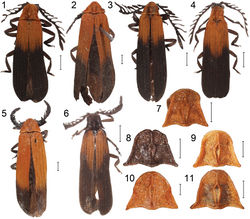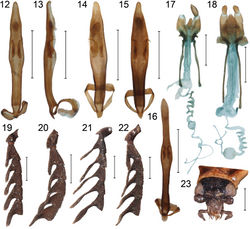Cautires sukosarensis
| Notice: | This page is derived from the original publication listed below, whose author(s) should always be credited. Further contributors may edit and improve the content of this page and, consequently, need to be credited as well (see page history). Any assessment of factual correctness requires a careful review of the original article as well as of subsequent contributions.
If you are uncertain whether your planned contribution is correct or not, we suggest that you use the associated discussion page instead of editing the page directly. This page should be cited as follows (rationale):
Citation formats to copy and paste
BibTeX: @article{Bocak2012ZooKeys241, RIS/ Endnote: TY - JOUR Wikipedia/ Citizendium: <ref name="Bocak2012ZooKeys241">{{Citation See also the citation download page at the journal. |
Ordo: Coleoptera
Familia: Lycidae
Genus: Cautires
Name
Cautires sukosarensis Bocak sp. n. – Wikispecies link – ZooBank link – Pensoft Profile
Type material
Male, holotype. Java, 14–16 km from Sukosari, 22. May 1982, M. Tao (KMTC). Paratypes, male, female. Java, 14 km from Sukosari, 23. May 1982, 25. May 1982, M. Tao (KMTC, LMBC).
Etymology
The specific epithet refers to the type locality.
Differential diagnosis
Cautires sukosarensis belongs along with Cautires walteri and Cautires taoi to a group of the small bodied aposematically colored species with brightly colored pronotum and basal half of elytra (Figs 1, 3, 4). This species resembles Cautires walteri in relatively small eyes and differs from other species in the extremely slender and long phallus and long antennal lamellae (Figs 16, 21). Male genitalia are similar to those of Cautires bolavensis Dudkova & Bocak, 2010 from Laos, but these species differ in the coloration and the size of eyes. Similarity of genitalia may indicate the close relationships of vicariant species from Laos and Java as reported by Bocak and Yagi (2010)[1].
Description
Male. Body small-sized, dorso-ventrally flattened, moderately slender; body, posterior half of elytra and appendages dark-brown to black; pronotum and basal half of elytra bright orange red, pronotum and elytra covered with dense orange pubescence (Fig. 3). Head small, clypeus slightly concave, labrum simply rounded, mandibles strongly curved apically, palpi with apical palpomeres pointed. Eyes small, hemispherically prominent, their frontal interocular distance 1.28 times eye diameter. Antennae shortly flabellate, 11-segmented, covered with short, dark colored setae (Fig. 21). Pronotum flat, transverse, 1.39 times wider at base than length at midline; frontal margin projected forward; lateral margins slightly elevated, convex, posterior angles acutely projected, pronotum with moderately robust median areola, attached to middle of basal margin of pronotum, connected to anterior margin by keel occupying one third of midline, lateral keels absent (Fig. 11). Elytra flat, with separately rounded apexes and well developed four primary longitudinal costae; secondary costae weak, cells regular, tiny, mostly quadrate. Legs laterally flattened, covered with dark colored setae. Phallus very slender, long, widest at midlength (Fig. 19). Female slightly larger, similar in body coloration, antennae serrate. Valvifers 1.55 times length of coxites.
Measurements
BL 8.05 mm, PL 1.18 mm, PW 1.64 mm, HW 1.89 mm, Edist 0.55 mm, Ediam 0.43 mm.
Distribution
Cautires sukosarensis is known at present only in the type series from Eastern Java.
Original Description
- Bocak, L; 2012: A revision of the Cautires obsoletus species group from Java (Coleoptera, Lycidae) ZooKeys, 241: 55-66. doi
Other References
- ↑ Bocak L, Yagi T (2010) Evolution of mimicry patterns in Metriorrhynchus (Coleoptera: Lycidae): the history of dispersal and speciation in South East Asia. Evolution 64: 39-52. doi: 10.1111/j.1558-5646.2009.00812.x
Images
|

